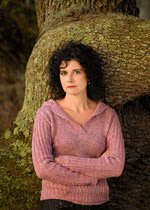(I find that actually completing the manuscript often translates into a writer who does everything else better--characters, setting, mechanics, and plot--probably because the discipline necessary to actually finish a huge project like a book carries over into all aspects of the work.)
The final hurdle that must be crossed to generate professional-level work is high, and it's hard for students to wrap their minds around, because it isn't as easy to point out as a misspelled word. Almost-publishable work generally lacks pacing. It isn't tight. And tight copy is like pornography...I know it when I see it.
So how is that helpful to you, who are so intimately entwined with your book that you can't see the forest for the trees? Well, first, you need to set it aside for a few days. Then you need to read it as if you just checked it out of the library on a whim. Read it for pleasure. If you're honest with yourself, you'll recognize that it feels flabby, somehow. You will be fighting this feeling throughout the editing process. Every time you read that book, you should be identifying useless adjectives and prepositional phrases that say nothing. Deleting such things should give you a feeling of great power!
On a larger scale, you must make sure that dry, boring exposition is not dragging your story down. Look at the opening chapter, in particular. How long does it take for something to happen? Beginning writers feel that they need to introduce each character and describe the setting and set up the action, all in the first chapter. Wrong! How many people would have watched Raiders of the Lost Ark
Yawn.
Instead, we moviegoers were plunged into danger and mystery and tarantulas and a honkin' big rolling rock before ever really meeting Indy. It felt like we were dropped out of an airplane. And we loved it.
When do you introduce your characters to your readers? After they're hooked. That, ladies and gentlemen, is what flashbacks are for.
I was still learning this when I wrote Artifacts
Please, please, please do not describe your alien villain's elaborate military uniform to me before he whips out a blaster and threatens somebody with it.
Mary Anna















"Almost-publishable work generally lacks pacing. It isn't tight. And tight copy is like pornography...I know it when I see it." GENIUS!!! THE WOMAN'S A GENIUS!!!
ReplyDeleteBev is on the floor, howling with laughter. Then Bev is jealous that SHE didn't come up with verbiage so witty.
You're amazing, Mary Anna Evans. That you are successful is no accident. You combine great gifts with hard work. (Okay, I guess I can't be jealous ... )
Those kind words are spoken by an amazing, successful woman who has augmented her great gifts with hard work...no, with brutal, chain-gang-level hard work.
ReplyDeleteIt takes one to know one, sweetie.
Like pornography, you know hard work when you see it? :-)
ReplyDeleteOh, you have left yourself wide-open here. The double-entendre possibilities simply abound, but I'm too ladylike to pursue them in public. Besides, this is a family-oriented sausage-making venue. But feel free to dream up your own pornographic joke, if you like...
ReplyDelete